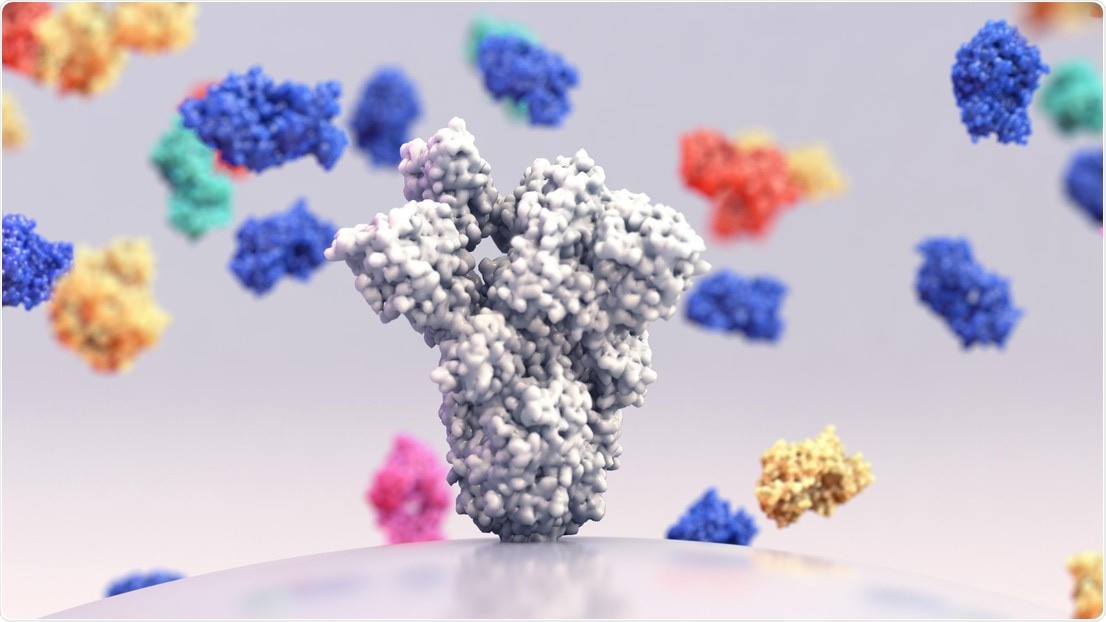Researchers from the Lausanne University Hospital (CHUV) and Ecole Polytechnique Fédérale De Lausanne (EPFL) identified a greatly potent monoclonal antibody that aims at the spike protein of SARS-CoV-2.

Broadly neutralizing monoclonal antibodies, binding antibodies that target multiple conserved sites on the spike (S) protein. Image Credit: ©iStockphoto.
It also effectively neutralizes all variants of concern pinpointed until now, including the delta variant. The observations have been published in the prestigious journal Cell Reports.
The recently discovered antibody was isolated using lymphocytes from COVID-19 patients registered in the ImmunoCoV research performed by CHUV’s Service of Immunology and Allergy. This antibody proves to be one of the highly powerful antibodies discovered to date against SARS-CoV-2. Structural characterization of the antibody shows that it attaches to an area that is not enthralled to mutations of the spike protein.
With the help of this tight interaction, the antibody hinders the spike protein from attaching to cells expressing the ACE2 receptor—the receptor used by the virus to enter and infect lung cells. This indicates that the antibody arrests the viral replication mechanism, allowing a patient’s immune system to evade SARS-CoV-2 from the body.
The researchers proved this protective mechanism through in vivo tests on hamsters—specimens administered the antibody were shielded against infection even after taking a highly infectious dose.
Along with its antiviral properties, the new antibody is designed to have a persistent effect on humans. Typical unaltered antibody safeguards for up to three to four weeks; however, the new antibody can protect patients for four to six months.
This makes it a fascinating preventive-treatment option for vaccinated people who fail to produce an immune response or for unvaccinated at-risk people. Organ transplant recipients, immunocompromised patients, and patients suffering from certain kinds of cancer can be shielded against SARS-CoV-2 by taking antibody injections two or three times a year.
CHUV and EPFL now intend to build on these promising results along with a start-up company that carries out clinical development and production of the antibody-containing drug, via cooperation and intellectual property agreements. Clinical trials of the drug are anticipated to begin in late 2022.
Treatment or prophylaxy
The study was carried out jointly by CHUV’s Service of Immunology and Allergy, led by Professor Giuseppe Pantaleo and Dr. Craig Fenwick, and by EPFL’s Laboratory of Virology and Genetics, led by Professor Didier Trono and Dr. Priscilla Turelli. The scientists were able to respond to the pandemic and identify this neutralizing antibody swiftly due to the multi-year support of the Swiss Vaccine Research Institute.
Professor Pantaleo’s department at CHUV also got support from the Corona Accelerated R&D in Europe (CARE) program, a part of the Innovative Medicine Initiative (IMI)—a public-private partnership that aims to handle bottlenecks in the drug discovery and development process in Europe.
The identification of this new antibody indicates a key step forward in the combat against COVID-19. It paves the way for enhanced treatments for severe forms of the disease along with improving prophylactic measures, particularly for patients with weakened immune systems. But this antibody is not designed to replace COVID-19 vaccines, which is still the most efficient means to prevent infection.
Source:
Journal reference:
Fenwick, C., et al. (2021) A highly potent antibody effective against SARS-CoV-2 variants of concern. Cell Reports. doi.org/10.1016/j.celrep.2021.109814.